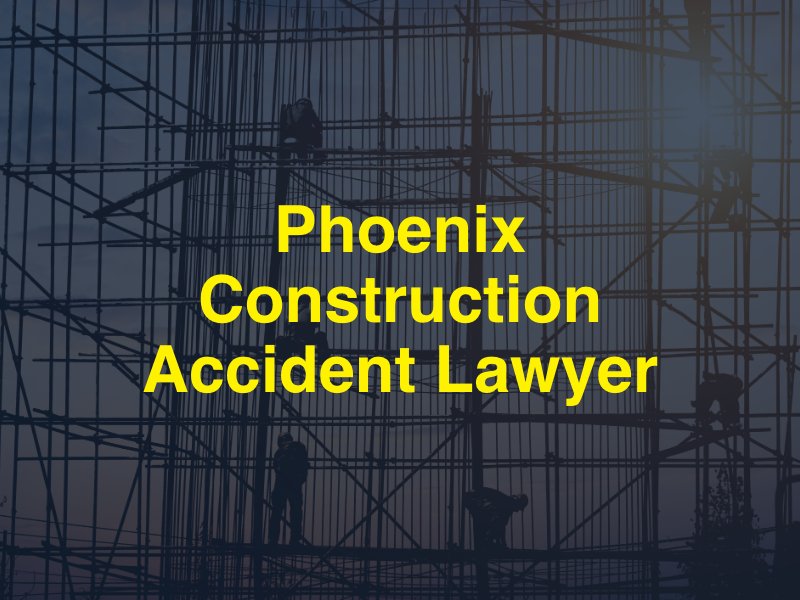Phoenix is one of the largest cities in the United States. As it has grown, the construction industry has continued to grow along with it. Yet, while the industry thrives, the accident rate for construction workers is more than 2.5x the rate of workers in the manufacturing industry. Additionally, 4 out of 100 construction workers suffer a non-fatal work injury each year. This doesn’t mean that those injuries aren’t serious. It only means that it doesn’t take their lives. They could still be strapped down by unexpected pain, worries, and debts.
If you or someone you love was hurt because of a construction accident, schedule a free case review with the experienced and compassionate lawyers of Hastings & Hastings in Phoenix. Let us help you understand your legal options and your rights by contacting us today.
 Founding attorney David G. Hastings created Hastings & Hastings in 1981. After graduating from the University of Arizona in business administration and law, Mr. Hastings began his legal career working for insurance companies, eventually shifting to represent victims of negligence. Since then, Mr. Hastings has become known as “The Discount King”, nicknamed by the Arizona Business Gazette, because he works hard to save his clients money.
Founding attorney David G. Hastings created Hastings & Hastings in 1981. After graduating from the University of Arizona in business administration and law, Mr. Hastings began his legal career working for insurance companies, eventually shifting to represent victims of negligence. Since then, Mr. Hastings has become known as “The Discount King”, nicknamed by the Arizona Business Gazette, because he works hard to save his clients money.
In addition to working hard to advocate for his clients, Mr. Hastings is involved in local philanthropy. He is involved in supporting organizations such as Special Olympics Arizona and Phoenix Children’s Hospital, as well as helping build homes in Mexico with 1Mission.
“I would highly recommend Hastings and Hastings to anyone I know.” – A.L.
“I was very happy with the result!” -N.
“I’m so pleased with my experience with them.” -T.

According to both OSHA and ADOSH, it is the responsibility of the employer to ensure that your worksite is safe. This includes construction sites. When construction site accidents occur, it means that an employer usually holds at least some of the responsibility of ensuring that the medical expenses and lost wages of the employee are taken care of. Yet, others may also be responsible as well.
Construction sites are dangerous and filled with potential safety hazards. Even if workers and visitors do their best to manage and improve the safety conditions of the site, accidents still occur. The most common causes of Phoenix construction accidents include:
If you are an employee and the Phoenix construction site is your place of employment, you should know that employers are required to carry workers’ compensation insurance. The good news is that if you file a workers’ compensation claim for your accident, you can get help with missed work and injury-related medical care. You do not have to prove fault to receive assistance.
Understanding the eligibility criteria for workers’ compensation in Arizona is vital if you suffer a job-related injury or illness. Staying informed helps to ensure that your rights are fully protected and that you maximize any potential benefits.
In Arizona, one of the first eligibility requirements for receiving workers’ compensation is that you must be an employee. If you’re an independent contractor, casual or occasional employee, or domestic worker, you usually aren’t covered by workers’ comp insurance.
To qualify for workers’ compensation in Arizona, your injury or illness must have occurred while performing tasks that are a part of your job duties. If you get injured outside the typical performance of these tasks – even if you happen to be at work when it happens – the injury may not be covered.
However, there are some gray areas – for instance, an employee who gets injured during a lunch break while being required to stay on company premises might be eligible for benefits.
In general, injuries sustained while commuting to and from work are not covered by workers’ compensation.
Qualifying for workers’ compensation can sometimes be complex, so having legal counsel on your side will help ensure that you make informed decisions every step of the way.
There are some other situations in which a worker won’t be eligible for workers’ compensation benefits, including (but not limited to):
Workers’ compensation won’t cover injuries that are self-inflicted. If an injury is the result of your own misconduct, including violating company policy or protocol, it’s likely to be excluded from coverage under workers’ comp.
Workers’ compensation generally doesn’t cover injuries that result from the employee’s use of drugs or alcohol. That means if an employer can demonstrate that your work-related injury occurred while you were under the influence, you could be disqualified from compensation.
Workplace accidents arising from horseplay, pranks, or roughhousing likely aren’t covered by workers’ compensation either. For example, if two employees are pretending to wrestle each other and it takes a turn for the worse and results in an injury, that would ordinarily fall outside the scope of what’s “work-related.” This underscores the importance of maintaining professional conduct at all times when on duty.
It’s important to know these exclusions because they play a part in determining what situations are deemed compensable.
Proving that an injury is work-related is the most critical part of a successful workers’ compensation claim. It involves providing credible evidence to establish that your injury occurred within the scope of your job responsibilities. This usually includes presenting the following evidence:
Having colleagues or other eyewitnesses confirm what happened can support your account and help demonstrate the relationship between work and your injury. Their statements may solidify facts like timelines, location, context, and just generally what happened to cause the accident.
If available, surveillance footage from security cameras provides objective visual evidence supporting your allegations. This type of documentation is particularly effective because it offers undisputed insights into what happened.
Medical records corroborate the nature and extent of your injury. They can reveal information such as the date and time of the initial medical attention, how you explained the occurrence to healthcare providers, the type of injuries sustained, and treatment protocols followed.
You should always notify your employer right after the accident occurs. It demonstrates that an injury did occur and that it was serious enough to report immediately. This notification ensures there is a formal record of the incident within your workplace.
The evidence listed above is just an example of the ways you can prove your injury was work-related. Each claim is different and may require additional types of evidence not mentioned. Always work with a lawyer as soon as possible.
However, this is only one of your options. You may also have the option to file a claim for personal injury against third parties who may also be liable for your injuries. A third party may include but may not be limited to:
To learn more about your legal options, schedule your free case evaluation with a Hastings & Hastings lawyer now.
If you’ve suffered a construction site injury caused by the negligence of a third party, not only can you make a workers’ compensation claim but you can also seek damages through personal injury litigation. The compensation that could potentially be recovered in such suits usually falls into three categories: economic damages, non-economic damages, and punitive damages.
These are designed to compensate for financial losses incurred as a result of your injuries. They include all quantifiable out-of-pocket expenses, such as medical bills (both present and future), loss of wages if the accident keeps you from working, property damage, and other expenses you’ve incurred as a result.
Non-economic damages compensate for more subjective, non-monetary losses that are directly caused by the injury. This category encompasses pain and suffering, emotional distress, and loss of enjoyment of life. It could also include expenses for seeking out mental health treatment, like therapists and psychiatrists.
Punitive damages are intended to punish the wrongdoer and deter similar behavior in the future. In Arizona, for punitive damages to apply, it must be proven that the defendant acted with an “evil hand and evil mind.” These types of damages are rarely awarded, as the standard is quite high.
Navigating the complexities of a third-party claim can be difficult without appropriate guidance, so consulting with a construction accident attorney could prove to be very beneficial.
Phoenix construction accident attorneys are well-versed in the intricacies of personal injury and workers’ compensation law. If you have been injured in a construction accident, their expertise can guide you through complex legal matters, ensuring your rights are fully protected. They tirelessly fight for deserving clients to secure compensation like medical expenses, lost wages, and other damages associated with these painful accidents. If you or someone you love was injured in a Phoenix construction accident, the experienced attorneys at Hastings & Hastings are here to help. Schedule your free consultation today.